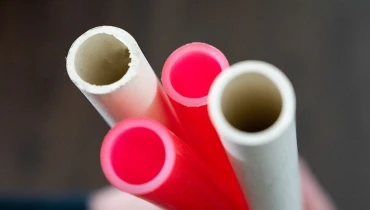
All good things must come to an end. That includes the piping in your home! Over the years, your metal pipes will rust, corrode, and decay. Water pipe replacement is an intricate process, so it’s important to know when your pipes need to be replaced.
Homes older than 60 years old are at high risk for damaged pipes, but every residential plumbing system needs regular attention. Make it a yearly task to inspect your pipes for signs of degradation or other irregularities, such as discoloration or flaking. Watch for leaks and monitor the color of your water. Of course, all homes should be inspected for damaged pipes, but old homes are the most at risk.
Water pipe replacement can be a tricky business. Learn what type of pipes you should consider for your home—PEX or CPVC pipe—and how much it costs to replace the pipes in your home.
What Is PEX Pipe?
PEX is a unique acronym because each letter does not stand for a single word. In PEX, the X stands for cross-linked, and the P and E represent polyethylene. Cross-linked polyethylene molecules create a strong, flexible material that withstands high pressure and temperature. This durability makes PEX an ideal material for hot and cold water supply lines. PEX pipe is available in sizes ranging from 1/4 inch to 4 inches in diameter.
Pros of PEX Pipe
PEX pipe is flexible and often easier to install than more rigid pipes, like copper or CPVC. Because of their flexibility, PEX pipes can sometimes fit inside structures without holes being drilled to accommodate. PEX pipes are the quietest water supply line option and will never create water hammer noise in the house. PEX offers high heath resistance and long-term durability, and it won’t corrode like metal pipes.
Cons of PEX Pipe
PEX pipe can only be installed in locations where it will not be exposed to hazardous materials, extreme heat, or UV radiation. These conditions can cause PEX material to break down faster than normal.
What Is CPVC Pipe?
Chlorinated polyvinyl chloride (CPVC) pipe is strong and durable. Many people are more familiar with its predecessor, PVC. The extra chlorine in CPVC pipe makes the material more resistant to softening in hot water environments. CPVC pipe comes in a wide range of sizes, from 1/2 inch to 2 inches.
Pros of CPVC Pipe
CPVC pipe can withstand higher temperatures than PVC or PEX pipe (up to 200 degrees Fahrenheit vs. 140 degrees Fahrenheit). It’s ideal for residential water distribution because it offers better joint strength than PVC and copper, and better corrosion resistance versus metal pipes. CPVC also virtually eliminates water hammer noise.
Cons of CPVC Pipe
CPVC pipe also has some disadvantages. Some cons of installing CVPC pipe include:
- CPVC is not resistant to many water-insoluble hydrocarbon-based chemicals, which can be found in cosmetics and household cleaning products.
- CPVC can’t withstand extremely high temperatures like copper pipe can.
- CPVC is not suitable for climates with extreme temperature variations due to its high thermal expansion coefficient.
- CPVC is more expensive than many other piping options.
Why Not Stick with Copper Pipes?
Copper pipes have been used in homes for a hundred years. However, PEX and CPVC both offer numerous advantages over copper pipes. Corrosion and pinhole leaks are two common problems with copper pipes. Their soldered joints tend to develop leaks at high temperatures. Copper pipes experience thermal loss unless they are fitted with insulating sleeves. When they are not properly insulated, condensation will occur under certain conditions. Plus, copper pricing is volatile and can lead to a sky-high bill if copper pipes are installed throughout a home.
How Much Does It Cost to Replace Pipes in a House?
Many factors determine how much it will cost to re-pipe a home, including:
- The size of the home.
- The number of fixtures (ex: sinks, toilets, showers/tubs) and water-consuming appliances in your home.
- The condition of current pipes.
- The accessibility and complexity of the current pipe system.
- The type of pipes selected (copper is the most expensive option).
Schedule Water Pipe Replacement Service with Mr. Rooter
Your local Mr. Rooter performs whole-house re-pipes and single pipe replacements. We’re also equipped to resolve frozen pipes and plumbing leaks. Call us today for all your water pipe needs. You can also request a job estimate online.

